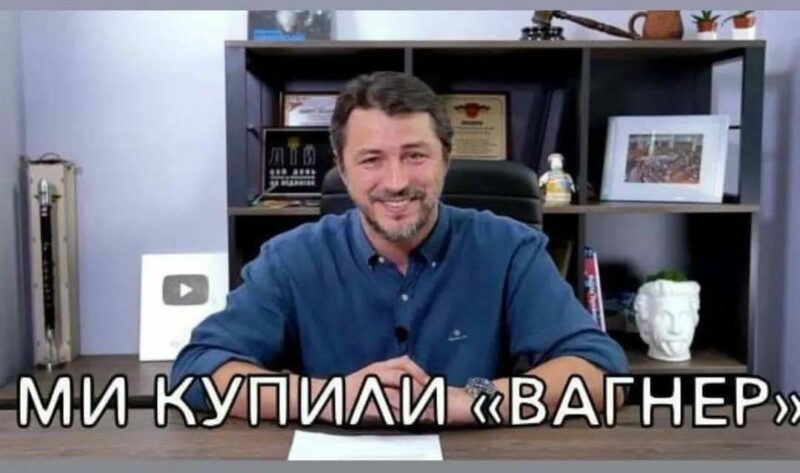“Let's cheer for both teams,” some users joked.
Originally published on Global Voices

A photoshopped image depicting Evgeny Prigozhin and his Wagner fighters as a ballet company performing the Swan Lake.
On June 23 and 24, many Ukrainians found themselves watching a drama unfold worthy of a reality TV show: the infamous Wagner mercenary group was rapidly mobilizing. But in this case, they were not moving toward Ukraine, Syria, or somewhere in the African continent where they drew international attention in 2017, but rather were moving toward their mother state, Russia.
After being stuck in Bakhmut, a small Ukrainian city, for about eight months, the group has seemingly flipped the script. The group, notorious for its war atrocities, seized Rostov-on-Don, a regional center in western Russia in several hours, and then marched toward Moscow, forcing governors along the route to block the roads leading to other Russian regional capital cities. Ukrainians hoped the Wagner rebellion would force Russian President Vladimir Putin to withdraw forces from Ukraine. Independent Russian media spread information that hinted at a panic in the Kremlin about Putin not having been seen anywhere and his plane leaving Moscow. Was it a coup? The beginning of the new Russian civil war? “Let's cheer for both teams,” some joked in Ukraine.
Ukrainian social media was flooded with images and videos of ballerinas — a reference to the 1991 coup attempt by Soviet conservatives in Moscow which virtually put an end to the Soviet Union. Back then, while the coupists were taking measures to topple Mikhail Gorbachev, the first and the last USSR president, the Soviet public, hungry for news, turned to the media to learn what was going on and instead found TV stations broadcasting a production of Swan Lake, seemingly unable to determine which side they should support and what exactly should be reported. In Ukraine, national democrats in the first democratically elected parliament — one of the results of Gorbachev's cautious reforms — seized the moment to proclaim Ukraine's independence from the USSR.
Some drew on more recent history posting jokes about Victor Yanukovych, a former Ukrainian president who was toppled by the Maidan protests in 2014 and fled to Rostov. Mocking Yanukovych's address to Ukrainians from Rostov soon after his hasty retreat from Kyiv in February 2014 which he finalized with a dramatic “Ostanovites!” or “Stop!” in Russian and referencing Wagner's recent occupation of Rostov, Ukrainian users posted a picture of him with the words “Ostanovites!” — already a meme — and “I have nowhere to flee from Rostov,” or the version of the same picture but with Yanukovych eating popcorn and saying: “Don't stop.”

Another meme with Yanukovych, by the Instagram account protsyshynofficial, is a caricature of Yanukovych fleeing Rostov astride an ostrich. When he fled Ukraine in 2014, in his residency activists found a zoo with ostriches on his property. In an interview a year later Yanukovych said that he “protected” the birds there causing a new flood of memes in Ukraine.
Others caricatured Yevgeny Prigozhin, the Wagner Group's leader, who spent previous months demanding ammunition from the Russian government for his Bakhmut fight. In Ukrainian memes, Prigozin was addressing the Ukrainian commander-in-chief: “Zaluzhny, give us ammunition!” Many in Ukraine referenced reported communication between Prigozhin and Kyrylo Budanov, the charismatic head of Ukrainian military intelligence, theorizing that Wagner's march to Moscow was somehow coordinated from Kyiv, as few Ukrainians had any faith that Russian citizens might be able to independently make any changes in Russia.
A popular joke was a chronology of the Russian army's development from “second-best in the world” in 2021 to second-best in Ukraine in 2022 to second-best in Russia in 2023. “I must give credit to the General Staff,” one user wrote in another viral Facebook post. “The counteroffensive started, indeed, in an unexpected place.” One of the other popular memes was with Serhiy Prytula, a former comedian turned politician and then the largest fundraiser for the Ukrainian military supplying it with vehicles, equipment, and even a satellite. “Ukrainians, this time has come,” Prytula's smiling photo read. “We bought Wagner.”

Prytula's meme which says “We bought Wagner.”
Despite the massive attention over the Wagner developments, in Ukraine, there was no widespread euphoria or hope that the Russian military engagement in Ukraine might decrease as a result of the internal conflict. Some viewed the Wagner march and the Kremlin's reaction to it as an important test of Russian ability and preparedness to meet an internal rebellion or military developments in its own territory. Many Ukrainians were watching the Wagner developments initially with malicious pleasure and a desire for retribution as Russians — most of whom continue to support Putin's war in Ukraine — were witnessing the march of thousands of violent war criminals onto their soil.
Some even expressed their indifference. “Prigozhin, are there 25,000 of you?” One Ukrainian tweeted. “Sign the petition regarding Tkachenko please.” Several days before the events, a new petition appeared on the presidential website's special section for petitions proposing to fire Olexandr Tkachenko, an unpopular Ukrainian minister of culture. A petition needs to attract no less than 25,000 signatures for the president of Ukraine to consider it.
Post a Comment